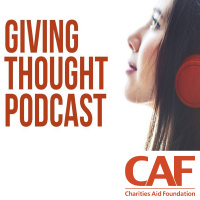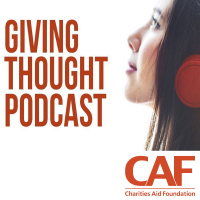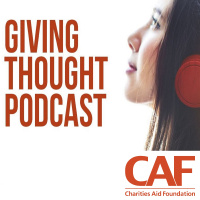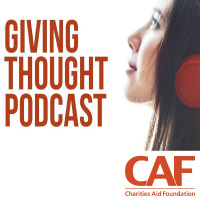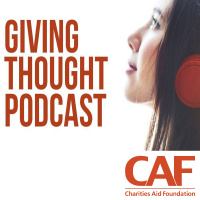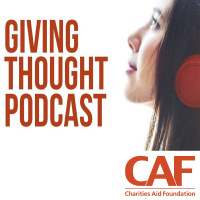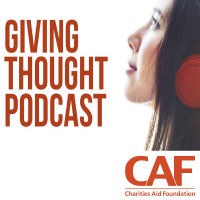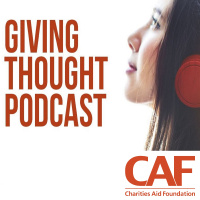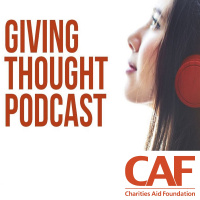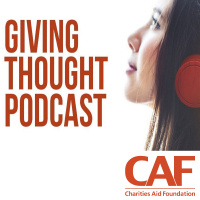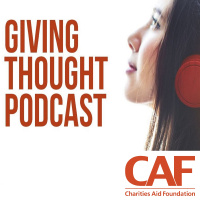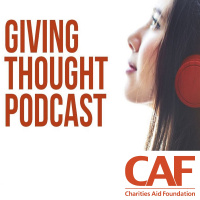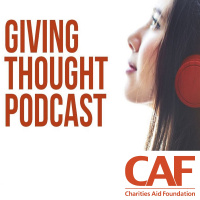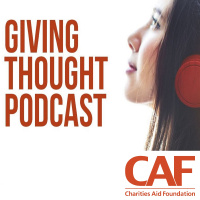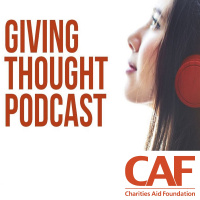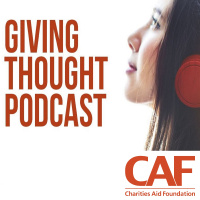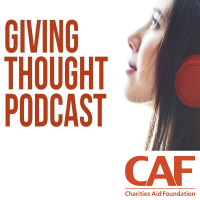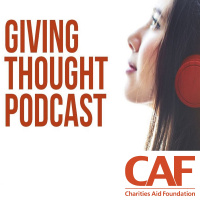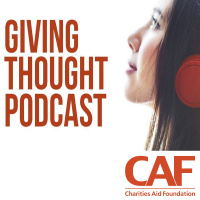Synopsis
Here goes nothing! We are pleased to launch the Giving Thought Podcast, brought to you by the Charities Aid Foundation's in house think-tank Giving Thought.In our first episode, we will be looking at the interplay between philanthropy, charity and politics. Given recent political events around the world and the trend for civil society activism to singled out for special scrutiny for its political influence this seems timely.We have decided to look at this issue from three interesting angles; Scrapping the Johnson amendment: What if President Trump follows through on his pledge to "destroy" the Johnson amendment which restricts the political lobbying of non profits and religious organisations? The emerging legal environment for Chinese civil society: New laws have made life much easier for donors and charities to operate ... as long as you agree with the government. Fake News: The proliferation of false stories targeted at specific audiences online raises problems for charities in getting their message across but also new needs for them to address. Read related content from Giving ThoughtAlgorithm Is Gonna Get You: what the rise of algorithms means for philanthropyAlgorithms are the automated decision processes that increasingly govern many aspects of our lives and the choices we make.Truth Decay: Philanthropy and the battle against misinformation and fake newsDoes philanthropy have a vital role to play in combating the widely-publicised threat of fake news?
Episodes
-
Philanthropy at the Movies (Oscars Special!)
12/02/2019 Duration: 43minEpisode 43 is an Oscars special! We explore philanthropy at the movies: what films there are about philanthropy (if any), what insight they can offer, and some ideas for future films that could be made. Topics covered include: Why aren’t there any genuinely great portrayals of philanthropy or the big questions it raises on film? Fictional philanthropists in movies The philanthropist as plot device or cinematic shorthand Do comic book adaptations offer the most insightful portrayal of philanthropy issues in the movies? Is Tony Stark (Iron Man) an example of the challenge of doing good with tainted money? What does X Men’s Charles Xavier tell us about enlightened self-interest? Is The Marvel Avengers: Civil War storyline really about the tension between philanthropic liberty and democratic accountability? Does Black Panther highlight the challenges of issue-based vs place-based identity in philanthropy? Is Thanos an effective altruist? Pitching some of the great philanthropic stories we could tell on film:
-
Krystian Seibert - Criticism of philanthropy: why, how & where next?
29/01/2019 Duration: 01h04minIn episode 42 we chat to Krystian Seibert, an Industry Fellow at Swinburne University of Technology in Melbourne, Australia. We discuss the current wave of critiques of philanthropy, why criticism is important, how to make that criticism constructive and what the response from policy and lawmakers should be. Including: How do we criticise ‘well’? Is some criticism in danger of ‘preaching to the converted’? To what extent does personal philosophy or ideology dictate how receptive you are to certain criticisms? Which criticism of philanthropy is hardest to answer? How much do the current US-focussed critiques resonate elsewhere (e.g. the UK or Australia)? Is there an argument to change how philanthropy is regulated by the state? How do we balance the freedom to make individual philanthropic choices with the responsibility to ensure philanthropy doesn’t create greater inequality? In the US the focus has been on the potential for philanthropy to subvert democracy by offering a means of influence outside the ele
-
Vinay Nair - Charities, Technology & Storytelling
15/01/2019 Duration: 51minIn episode 41 we chat to Vinay Nair, co-founder and CEO of social good tech startup Lightful about how charities can use technology to tell their stories more effectively, and some of the key opportunities and challenges. Topics covere: Why is storytelling important for charities? Has social media changed the game for charities in terms of how they communicate? Have some of these tools levelled the playing field between big and small (or well-known and obscure) organisations? Is there sometimes a tension between focusing on individual stories/emotions and focusing on objective metrics/measures of success? Or can the two be successfully combined? How well-equipped are charities to take advantage of the potential of digital? If some organisations are struggling, what are the key barriers? Is there a danger that social media and online discourse create perverse incentives to sensationalise or simplify issues, because everyone is competing for scarce attention? Does this present a particular challenge for charit
-
2018 End of Year Special (Part 2): Predictions for 2019
20/12/2018 Duration: 27minIn part 2 of our bumper end of year special (episode 40), we make some predictions for what 2019 might hold... 2019 Predictions: Politics & Economics BREXIT (or not…?) General Election? UK voluntary reporting on SDGs Ongoing impact of austerity Local government funding and Local Authorities running out of money Populism & ongoing challenges for democracy Another global financial crash? Philanthropy & Civil Society More critiques of big philanthropy; general default more critical (also in UK?) Focus on think tanks, dark money etc Austerity: debating role of charity vs state Further closing space issues, including digital angles (misinformation, astroturfing etc) Networked models for social change Line between civil society and politics will come under increasing strain Shifting power; democratising philanthropy Next big fundraising/charity scandal? Technology Continuing tech backlash? More funders focussing on algorithmic bias Pushback on AI ethics- criticism that it frames the debate in
-
2018 End of Year Special (Part 1): 2018 in review
20/12/2018 Duration: 39minIn an end of year special, bumper 2-part episode 40, we look back over 2018 and ahead to 2019. In part 1, we review some of the biggest stories and themes affecting philanthropy and civil society over the year and look at how we got on with our predictions from the start of the year. Topics covered include: Stories and themes: Trust, power & accountability The Presidents Club Dinner scandal Safeguarding and international development The rise of networked social movements, New Power etc. All change at the Charity Commission The Civil Society Futures Inquiry A big year for books critiquing philanthropy: Winners Take All: The elite charade of changing the world by Anand Giridharadas Just Giving: How philanthropy is failing democracy and how it can do better by Rob Reich Decolonizing Wealth by Edgar Villanueva Reviewing 2018 predictions US tax bill controversy re deduction & Focus on theoretical justification for tax breaks (linked to devolved Scottish powers) More focus on advocacy and campaign
-
Philanthropy & Empathy
11/12/2018 Duration: 46minIn episode 39 we look at the relationship between philanthropy and empathy. Including: -What does neuroscience tell us about the link between empathy and altruism? -The importance of physical proximity -Does empathy lead us to prioritise giving to those who are sufficiently “like us”, at the expense of others? -How do our unconscious biases affect our empathy? The identifiable victim bias and victim blaming. -Is empathy in tension with rationality when it comes to philanthropy? -Historical examples of approaches to philanthropy that lacked empathy: home visitations, voting charities and “telescopic philanthropy” -Rationality vs empathy throughout history: from the Charity Organization Societies to Effective Altruism? -What impact will technology have on our ability to be empathetic in future? -How can Virtual Reality be used to drive empathetic responses from donors and supporters? -Will tech-enabled ‘filter bubbles’ negatively affect our ability to empathise? -Rationality vs Empathy 2.0? Will philanthropy in
-
Rob Reich - Philanthropy, Democracy & Inequality
27/11/2018 Duration: 50minIn episode 38 we talk to Professor Rob Reich from Stanford University about his new book, Just Giving: Why Philanthropy is Failing Democracy and How it Can Do Better and about his wider work exploring the political philosophy of philanthropy. In a wide-ranging conversation, we cover: -What motivated him to write the book? -Why has philanthropy been largely ignored as a subject of study by political philosophers and political theorists over the years? -Does he see his book as part of a growing trend of criticism of elite philanthropy at the moment? -Why does philanthropy potentially subvert democracy? -Is elite philanthropy a plutocratic exercise of power? And can this ever be justified? -Does mass market philanthropy represent a powerful means of decentralising power and choice about public goods? Or is this always undermined by the disproportionate influence of those with large amounts to give? -Do tax breaks for philanthropy exacerbate inequality? How could we structure them differently? -How should we unde
-
Philanthropy & the Welfare State
13/11/2018 Duration: 36minIn episode 37, we explore the relationship between philanthropy and the notion of a Welfare State. We look at the role philanthropy played in the origins of state welfare, what economics and other sciences can tell us about the relationship between the two, and how we should view the role of philanthropy in relation to the state today. Including: -The history of the back-and-forth relationship between philanthropy and state in the UK -Why did some think the birth of the Welfare State should have spelt the end for philanthropy? -Is there a relationship between the size of the state and levels of giving? -Does state welfare provision necessarily "crowd out" philanthropy? Or could it actually "crowd it in"? -The importance of charitable campaigning within the welfare state -The emergence of outsourcing and public service commissioning -Are we now seeing a backlash against public service delivery by charities? Links: My piece on “The UK Civil Society Strategy and The History of State vs Philanthropic Welfare P
-
Philanthropy, Risk & Innovation
30/10/2018 Duration: 44minIn episode 36, we look at the relationship between risk, innovation and philanthropy. The ability to take risks and innovate is often claimed to be on of the key strengths of philanthropy, but is this really true? How does philanthropy innovate? Why can it take risks? And what makes it different to state or private sector approaches? Topics we cover include: - What kinds of risk can philanthropy take? -Why is it able to take these risks? -Does philanthropy find innovative new ways of achieving social outcomes? -What is the exit for philanthropic innovation once it has been proven to work? -Is philanthropy losing its control of social innovation to the public and private sector? -How has philanthropy itself innovated over time? From the rise of associational philanthropy in the 18th century to the development of mass-market giving in the 20th century. -Social investment and blended approaches -Micro donations and automated philanthropy -Innovation in causes: philanthropic campaigning and public opinion - Whe
-
Philanthropy & Religion
16/10/2018 Duration: 37minIn episode 35, we look at the the relationship between religion, faith and philanthropy. Including: 1) Faith as a factor in individual giving -Evidence from behavioural science -The role of places of worship in bring diverse communities together and making people aware of issues -Religious identity, communities of purpose and giving circles -Religious obligations to give: tithing, Tzedakah and Zakat 2) Organised religion and the evolution of charity -1601 Statute of Charitable Uses: why wasn't religion included? -The 1891 Pemsel Case and the "four heads of charity" -US religious causes and closed congregations 3) Religion, philanthropy and civil society today -Is religion still the most popular cause? -Obligations to fund the monastic life in Myanmar and Thailand -The deep relationship between international aid and religion -Places of worship as community focal points and welfare providers -Is the world getting less religious or more? -Religious persecution
-
Connie Gallippi - Cryptophilanthropy & Blockchain
02/10/2018 Duration: 51minIn episode 34, Rhod chats to Connie Gallippi, Founder and CEO of the BitGive Foundation (the first US nonprofit to accept cryptocurrency donations). They discuss: - What is the potential for cryptophilanthropy? -What are some of the practical challenges to taking donations in cryptocurrency? -Is the current crypto bear market likely to result in more or fewer donations of crypto? -What is the wider potential of blockchain for the nonprofit sector? -What does radical transparency bring for donors and beneficiaries? -How might we solve the blockchain last mile problem? -Should nonprofits be concerned about the environmental cost of existing blockchain tech? Related links: https://www.bitgivefoundation.org/ https://www.givetrack.org/
-
Zoe Amar - Charities, Technology & Digital Transformation
18/09/2018 Duration: 41minIn episode 33, Rhod chats to Zoe Amar about digital transformation in the charity and non-profit world, and how organisations can get to grips with the opportunities and challenges presented by new technology. Topics covered include: -What role does leadership play in digital transformation? -Is new technology perceived as too risky? How can we overcome this barrier? -How will our workplaces need to change in response to developments in tech? -Is there a danger of a "digital brain drain" if non-profits cannot offer appealing opportunities for tech-savvy young professionals? -Can new technologies benefit small organisations as well as larger ones? -What role can charities play in the design of new technology to ensure it is human-centred? -Should charities be concerned about the mental health and social impacts of social media and other tech tools? -Can charities play a wider role in addressing the negative impact of technology? -Why should the non-profit world wake up to AI? Related Links Zoe's website The
-
Chris Willis Pickup - Charity Law, Regulation & Technology
04/09/2018 Duration: 57minIn episode 32 we chat to Chris Willis Pickup, Partner at Taylor Vinters law firm and former Head of Litigation for the Charity Commission for England & Wales. charity law. We discuss a whole host of topics including: -What does charity law actually entail? -Defining charitable purposes -Dormant trusts, the Cy Pres doctrine and the National Fund -Campaigning and charity law -What is the role of a charity regulator? -Developing digital skills in charities -Charity RegTech -What role can lawyers play in promoting philanthropy?
-
Civil Society Strategy Special
10/08/2018 Duration: 38minIn episode 31, we take a look through the recently published UK government Civil Society Strategy. We explore what it means for charities, businesses and communities in the UK, and how it fits in with wider global trends affecting civil society. Including: -The value of having a strategy -Broadening the definition of civil society -Place and civic philanthropy -Civic engagement and direct democracy -The importance of civil society campaigning -Welfare and the lines between state and voluntary provision throughout history -Getting to grips with technology -Responsible business -The UK's ambitions to be "the world leader in philanthropy services".
-
Fran Perrin: Philanthropy & Transparency
17/07/2018 Duration: 41minIn episode 30, Rhod chats to Fran Perrin- founder and Director of the Indigo Trust, founder of 360 Giving, former government policy advisor and member of the famously philanthropic Sainsbury family - about promoting transparency in philanthropy. Topics touched on include: -Why transparency is valuable -When transparency might not be such a good thing -Are foundations and philanthropists resistant to transparency? -How can technology help people and communities, and how can it cause harm? -Does philanthropy take enough risks? -How do you address the imbalance of power between donor and recipient? -What policy changes are needed to boost the culture of philanthropy? -The value of “meta-philanthropy” (i.e. philanthropy aimed at supporting more philanthropy) -The role of upbringing in instilling a sense of philanthropic 'duty'
-
Ben Joakim & Paul Currion from Disberse: Philanthropy, International Aid and blockchain technology
03/07/2018 Duration: 45minIn this episode (number 29), I chat to Ben Joakim and Paul Currion from Disberse - a fintech startup applying blockchain technology to the international development and aid sector. We had a wide-ranging chat about the challenges they have found in getting beyond the hype surrounding blockchain, and the genuine opportunities they believe the technology has to offer. Including: -Why blockchain? What can you do with a blockchain in an aid context that you can't do with another, simpler technology? -The last mile problem: how do you get money and goods to where they are actually needed when using blockchain, assuming that people and communities on the ground are not themselves using the technology? -Regulation: how are governments and regulators approaching blockchain technology? What challenges does this present for those trying to use it in a civil society context? -Cryptocurrency: Why have Disberse chosen not to work with existing cryptocurrencies? What are the opportunities and pitfalls of doing so? -State of
-
Ben Soskis - Learning from the history of philanthropy
26/06/2018 Duration: 01h10minIn episode 28, Rhod is joined by Ben Soskis, a Fellow at the Urban Institute and editor of HistPhil.org, for a wide-ranging (and quite long!) chat about the history of philanthropy and what it can teach us about the big challenges facing charities and donors today. They talked about all sorts of things, such as: -Why is studying the history of philanthropy worthwhile, and what are the limitations of historical comparison? -What are the most telling criticisms of philanthropy that have been seen through the ages? -Which supposedly “new” developments in philanthropy actually have historical precedents? What, if anything, is genuinely new? -Is philanthropy anti-democratic? Can that sometimes be a good thing? -Why have power dynamics always been such a challenge for philanthropy, and what efforts have been taken to overcome this challenge? -What are the biggest challenges facing philanthropy in the US right now? Related content: histphil.org George Soros and the Demonization of Philanthropy (An article by Ben
-
Rachel Rank- Open Data, grantmaking and philanthropy
12/06/2018 Duration: 41minIn episode 27 of the podcast Rhod chats to Rachel Rank, CEO of 360 Giving (www.threesixtygiving.org)- an initiative promoting and supporting an Open Data approach among UK grantmakers. Topics covered include: -The background and rationale to 360 Giving -What challenges has 360 Giving faced in terms of getting grantmakers to adopt an open data approach? -How are organisations using the information that is being published? -Where does the work of 360 Giving fit within the wider move towards open data and transparency? -What is the potential for applying new techniques and tools such as machine learning to the data being opened up on grantmaking? -Will there be new challenges when it comes to making data more accessible in the light of GDPR and the growing unease about data privace and usage?
-
Philanthropy, Civil Society & Artificial Intelligence
22/05/2018 Duration: 34minIn episode 26, Rhod looks at the impact Artificial Intelligence (AI) is going to have on philanthropy and civil society. Topics covered include: -What are we talking about? We look at what AI actually means and why it has come to prominence in recent years, and consider 3 broad ways in which AI is going to affect civil society. -AI for Good: How is AI being put to use to deliver social and environmental benefits, and where could this go in the future? We touch on fascinating projects using machine learning for medical research and environmental protection, and explore the use of chatbots and voice-activated assistants. -The wider operating environment: AI seems set to disrupt the way that organisations, and even entire industries, operate. Civil society organisations could harness the benefits of automation, but will also need to address the wider challenges that it poses to the future of the workplace. Regulation could also be transformed, and CSOs will have to adapt. And the ways in which we are able to g
-
Fundraising (Interview with Dan Fluskey)
08/05/2018 Duration: 39minIn this episode (number 25) Rhod chats to Dan Fluskey, Head of Policy and External Affairs at the UK's Institute of Fundraising about the asking side of the philanthropy equation. Topics covered include: -Is there actually a crisis of public trust in charities? -What has the impact of a number of fundraising scandals been on the charity world? -How do fundraisers balance the short term appeal of using techniques that work in terms of raising money against the danger of longer-term damage to the relationship with supporters? -Is fundraising supposed to make us feel uncomfortable? -How are fundraisers using new technology like virtual reality (VR)? -What impact might new approaches like crowdfunding have on traditional charity fundraising?

